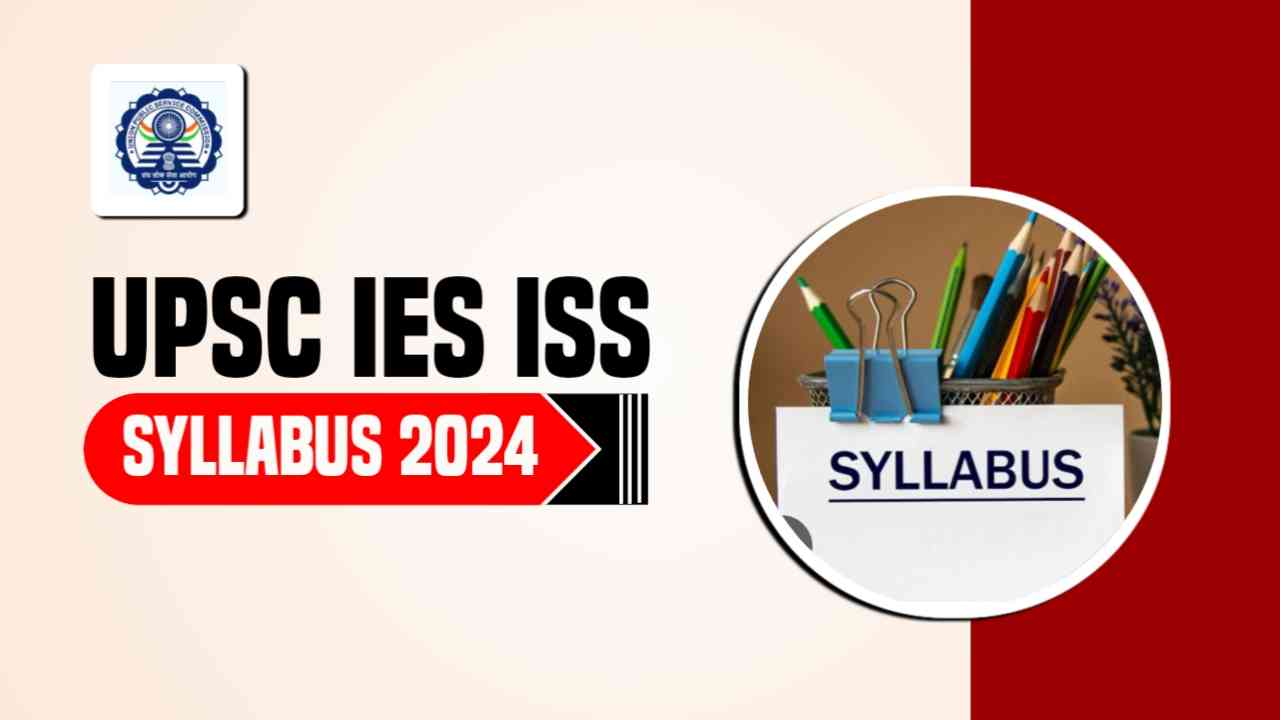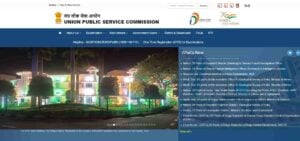UPSC IES ISS Syllabus 2024:संघ लोक सेवा आयोग (यूपीएससी) 21 जून 2024 को भारतीय अर्थशास्त्र/सांख्यिकीय सेवा परीक्षा 2024 आयोजित करेगा। योग्य व्यक्ति जो यूपीएससी अर्थशास्त्र और सांख्यिकी सेवा रिक्तियों में रुचि रखते हैं, वे यहां से विस्तृत UPSC IES ISS Syllabus and परीक्षा पैटर्न की जांच कर सकते हैं। After checking the UPSC IES ISS Syllabus you can start your preparation accordingly.
जाने इस पोस्ट में क्या क्या है


UPSC IES ISS Syllabus 2024 – Highlights
| Commission Name | Union Public Service Commission (UPSC) |
| Name of the Examination | INDIAN ECONOMIC SERVICE EXAMINATION,
INDIAN STATISTICAL SERVICE EXAMINATION, |
| Article Type | UPSC IES ISS Syllabus and Exam Pattern |
| Mode of Application | Online |
| Online Application Starts From | 10-04-2024 |
| Last Date of Online Application | 30-04-2024 |
| Date of Exam | 21st June, 2024 |
| Official Website | upsc.gov.in |
UPSC IES ISS Selection Process
- Written Examination (1000 Marks)
- Interview/ Viva Voice (200 Marks)
UPSC IES ISS Exam Pattern 2024
The general overview of both the UPSC IES and ISS 2024 Exam Pattern is as follows:
UPSC IES Recruitment Exam Pattern
- Mode of Exam: Offline
- Type of Questions: Subjective Type (Offline)
- Language: English only
| Subjects | Maximum Marks | Time Allotted |
| General Studies | 100 | 3 Hours |
| General English | 100 | 3 Hours |
| General Economics – I | 200 | 3 Hours |
| General Economics – II | 200 | 3 Hours |
| General Economics – III | 200 | 3 Hours |
| Indian Economics | 200 | 3 Hours |
UPSC ISS Recruitment Exam Pattern
| Subjects | Maximum Marks | Time Allotted |
| General Studies | 100 | 3 Hours |
| General English | 100 | 3 Hours |
| Statistics – I (Objective) | 200 | 2 Hours |
| Statistics – II (Objective) | 200 | 2 Hours |
| Statistics – III | 200 | 3 Hours |
| Statistics – IV | 200 | 3 Hours |
Note: There will be 80 objective-type questions (MCQ) of Statistics I and Statistics II subjects in the Indian Statistical Service (ISS) exam. The rest of the UPSC ISS papers will be subjective/ Descriptive Type.
UPSC IES ISS Syllabus 2024
Candidates can check here topics for the UPSC IES ISS Syllabus and start their preparation for their upcoming examination –
UPSC ISS Syllabus
|
Subject |
Topics for UPSC IES ISS Syllabus |
| General English |
|
| General Studies |
|
| Statistics I (Objective Type) | Probability:
Statistical Methods:
Numerical Analysis:
Computer Application & Data Processing:
|
| Statistics II (Objective Type) | Linear Models:
Statistical Inference & Hypothesis Testing:
Official Statistics:
|
| Statistics- III (Descriptive Type) |
Sampling Techniques:
Econometrics:
Applied Statistics:
|
| Statistics-IV (Descriptive Type) |
(50% Questions from all subsections below & Candidates need to choose two subsections) Operations Research and Reliability:
Demography and Vital Statistics:
Survival Analysis & Clinical Trial:
Quality Control:
Multivariate Analysis:
Design and Analysis of Experiments:
Computing with C and R:
|
UPSC IES Syllabus
There are six papers in the written examination. Check here the topics that cover the UPSC IES Syllabus:-
|
Subject |
Topics for UPSC IES ISS Syllabus |
| General English |
|
| General Studies |
|
| General Economics I | Part – A:
Part – B:
|
| General Economics II |
|
| General Economics III |
|
| Indian Economics |
|
Important Links
| UPSC IES ISS Recruitment 2024 | Website |
| UPSC Official Calendar | Website |
| UPSC Official Website | Website |
| Join Our Telegram Group | Website |
FAQs Related to UPSC IES ISS Syllabus 2024
Question: Is there any negative marking in the UPSC Indian Statistical Services Exam?
Answer: Yes, there will be a negative marking of 0.33 for every incorrect response in the Objective type Paper.
Question: Will there be any marks deduction if the handwriting is not easily understood by the examiner?
Answer: The examiner may deduct marks if the handwriting is not easily understood. No marks will be given for superficial (slight) knowledge.
आपके उज्जवल भविष्य के लिए महत्वपूर्ण जानकारी यहाँ उपलब्ध है - सरकारी नौकरियाँ, परीक्षा परिणाम, प्रवेश पत्र और शैक्षिक अवसर। नवीनतम अपडेट और आवश्यक सूचनाओं के लिए BiharHelp ऐप डाउनलोड करें - आपकी सफलता का साथी।


